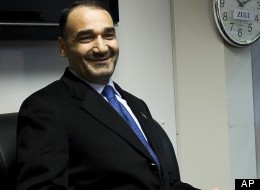High_Gravity
Belligerent Drunk
Atta Muhammad Noor, Afghan Governor, Criticizes U.S. Exit Plan

Atta Muhammad Noor, Afghan Governor, Criticizes U.S. Exit Plan

MAZAR-E-SHARIF, Afghanistan -- Atta Muhammad Noor, a former Northern Alliance warlord who many consider to be the strongest governor in Afghanistan, is the kind of longstanding ally American officials would love to comfortably count on as they plan their withdrawal from the decade-old war here.
So it may sting a little to hear Noor lash out about the American exit strategy, and especially the U.S.-supported plan to bring the Taliban to the negotiating table, before a room full of American military officers.
"The current peace process as conducted by our government and by the U.S., with their meetings in Qatar, I don't think it can lead to a good outcome," Noor said last week in a conversation with a small gathering of reporters at his estate in Mazar. The gathering was organized and attended by a half-dozen coalition military officials. "It will be very difficult to sit at the same table with the leaders of the Taliban."
Noor's complaint may not be unexpected -- the idea that ex-Northern Alliance leaders would resist reconciliation talks with their ideological and military arch-enemies, the Taliban, is hardly surprising.
But it also clashes with recent American policy, which has focused on working behind-the-scenes to bring the Taliban back to peace talks. The hope, analysts and officials say, is that if a political balance can be struck between the insurgents and the government of President Hamid Karzai, the U.S. may be able to draw down its military presence by the end of 2014 without precipitating a new round of civil conflict.
If so, the political rebellion of the governors and warlords of the North, many of whom fought side-by-side with American special forces in the 2001 overthrow of the Taliban, could be a deeply complicating circumstance for the U.S. exit plan.
"I share the belief with my father that Americas Afghan strategy is shortsighted and probably based on domestic rather than strategic considerations," wrote Abdul Matin Bek, the son of a recently slain Northern tribal leader, who had fought with the Americans against the Taliban, in a January New York Times op-ed that captured the sentiment. "As Afghans, we rarely understand U.S. policy. One day the U.S. military declares the Taliban the enemy, the next day theyre willing to make peace. Does this policy reflect the realities on the ground? Is it a winning strategy?"
Last week, that disaffection emerged in the form of one of the odder sideshows of Afghan politics, when U.S. Rep. Dana Rohrabacher (R-Calif.), who had recently met in Germany with several anti-Karzai ex-Northern Alliance officials, was blocked by the government from entering the country.
Atta Muhammad Noor, Afghan Governor, Criticizes U.S. Exit Plan